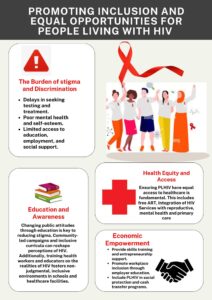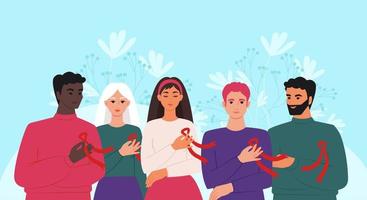By Mustapha Salisu Yakubu, YOLHAC Champion
Despite significant advancements in HIV prevention and treatment, people living with HIV (PLHIV) still face pervasive stigma, discrimination, and social exclusion. These barriers not only violate human rights but also undermine public health efforts. Promoting inclusion and equal opportunities for PLHIV is not just a moral imperative—it is essential for sustainable development, social justice, and ending the HIV epidemic.
The Burden of Stigma and Discrimination
Stigma remains one of the most significant challenges for PLHIV. According to UNAIDS, one in eight people living with HIV report being denied health care because of their HIV status, and many experience workplace discrimination, social exclusion, and gender-based violence [UNAIDS, 2021].
Discrimination contributes to:
- Delays in seeking testing and treatment.
- Poor mental health and self-esteem.
- Limited access to education, employment, and social support.
To create inclusive environments, we must address the systemic and societal attitudes that perpetuate these inequalities.
Legal and Policy Interventions
A rights-based approach to HIV includes legal protections against discrimination and equal access to services. Countries that have enacted anti-discrimination laws show improved health outcomes among PLHIV.
The Global Commission on HIV and the Law emphasizes the importance of repealing punitive laws—such as those criminalizing HIV transmission or same-sex relationships—that deter individuals from accessing care [UNDP, 2012].
Policymakers must:
- Ensure PLHIV are protected under national anti-discrimination laws.
- Promote workplace policies that uphold equal employment opportunities.
- Engage PLHIV in lawmaking and governance processes.
Education and Awareness
Changing public attitudes through education is key to reducing stigma. Community-led campaigns and inclusive curricula can reshape perceptions of HIV.
Initiatives like the People Living with HIV Stigma Index, developed by GNP+, UNAIDS, and partners, provide crucial data to inform stigma-reduction programs and track progress [Stigma Index, 2020].
Additionally, training health workers and educators on the realities of HIV fosters non-judgmental, inclusive environments in schools and healthcare facilities.
Economic Empowerment
PLHIV are more likely to face economic hardship due to workplace discrimination or health-related challenges. To promote equality, it is vital to:
- Provide skills training and entrepreneurship support.
- Promote workplace inclusion through employer education.
- Include PLHIV in social protection and cash transfer programs.
Economic empowerment helps restore dignity and independence, contributing to overall well-being and improved adherence to treatment.
Health Equity and Access
Ensuring PLHIV have equal access to healthcare is fundamental. This includes:
- Free or affordable antiretroviral therapy (ART).
- Respectful and stigma-free services.
- Integration of HIV services with reproductive, mental health, and primary care.
The World Health Organization (WHO) underscores that inclusive healthcare systems—where services are patient-centered and non-discriminatory—lead to better adherence and lower HIV transmission rates [WHO, 2023].
Community Engagement and Leadership
PLHIV must be at the center of the HIV response. “Nothing for us without us” has been a powerful rallying cry in the global HIV movement.
Support should be directed toward:
- Networks and organizations of PLHIV.
- Peer-led support groups.
- Representation in decision-making bodies.
Inclusion means ensuring PLHIV have the agency to lead and shape the policies that affect their lives.
Conclusion
Promoting inclusion and equal opportunities for people living with HIV is a shared responsibility that requires coordinated efforts from governments, civil society, healthcare providers, and communities. By breaking down barriers and fostering inclusive policies and practices, we can create a world where HIV status no longer determines one’s access to dignity, opportunity, or hope.
Mustapha Salisu Yakubu is a Champion with The Youth Leading HIV Awareness Campaign (YOLHAC)



